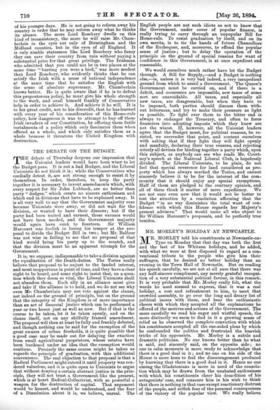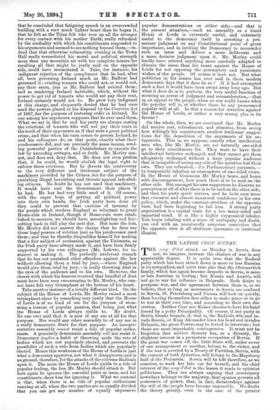MR. MORLEY'S HOLIDAY AT NEWCASTLE.
MR. MORLEY told his constituents at Newcastle-on- Tyne on Monday that that day was both the first and the last of his Whitsun holidays, and he added, with what we were at first disposed to regard as a con- ventional tribute to the people who give him their suffrages, that he desired no better holiday than an evening in the Town Hall of Newcastle. But on reading his speech carefully, we are not at all sure that there was any half-sincere compliment, any merely grateful recogni- tion of a very substantial political favour, in this remark. It is very probable that Mr. Morley really felt, what the words he used seemed to express, that it was a real holiday, a rest and refreshment to him, to meet that crowded assembly, to go over the long and dreary list of political issues with them, and hear the enthusiastic cheers with which they accepted all the explanations he offered of the motives and actions of the Government. The more carefully we read his eager and wistful speech, the more distinctly we seem to find in it a growing sense of relief as he observed the complete conviction with which his constituents accepted all the one-sided pleas by which he confounded the politics and frustrated the knavish tricks of his opponents. Mr. Morley is a subtle and dramatic politician. No one knows better than he what is said, and sincerely said, on the opposite side ; no one in calm moments is more ready to acknowledge that there is a good deal in it ; and no one on his side of the House is more keen to feel the discouragement produced by knowing that there is a good deal in it. Hence no one among the Gladstonia,ns is more in need of the consola- tion which may be drawn from the unabated enthusiasm with which his constituents cheer his demolition of his antagonists' case, and reassure him in his wish to think that there is nothing in that case except reactionary distrust of the people, and selfish fear of the personal consequences of the victory of the popular view. We really. believe that he concluded that fatiguing speech in an overcrowded building with a very much lighter heart than he began it, that he felt as the Titan felt who rose up all the stronger for every contact with his mother Earth, really refreshed by the cordiality with which his constituents responded to his arguments and seemed to see nothing beyond them,—in- deed that that otherwise exhausting evening in the Town Hall really resuscitated his moral and political strength more than any mountain air with too complete leisure for recalling all that might be justly said on the opposite side, could have resuscitated it. Take, for instance, his indignant rejection of the compliment that he had, after all, been governing Ireland much as Mr. Balfour had governed it ; evicting tenants who could not, or would not, pay their rents, just as Mr. Balfour had evicted them ; and so rendering Ireland habitable, which, without the power to get rid of tenants who would not pay their rent, Ireland certainly would not be. He grew very indignant at this charge, and eloquently denied that he had once used the powers placed at his disposal by the Coercion Act of 1887, for the purpose of restoring order in Ireland. No one among his opponents supposes that he ever used them. What we say is, that he and his party are always casting the evictions of tenants who will not pay their rents in the teeth of their opponents as if that were a great political crime, and that when his turn comes to govern Ireland, he and his colleagues do, on that point, exactly what their predecessors did, and use precisely the same means, send- ing powerful parties of the Constabulary to execute the • law by unroofing cottages, and so forth. Mr. Morley can- not, and does not, deny that. He does not even profess that, if he could, he would abolish the legal right to enforce these evictions. But he diverts the controversy to the very different and irrelevant subject of the machinery provided by the Crimes Act for the purpose of punishing illegal boycotting and threats against law-abid- ing citizens. No doubt he has not used that machinery. It would have cost the Government their places if he had. He has bad very little need of it. Of course, with the eager hope of getting all political power into their own hands, the Irish party have done all they could to prevent that exercise of tyranny by the people which renders England so reluctant to grant Home-rule in Ireland, though if Home-rule were estab- lished to-morrow, we should have moonlighting and boy- cotting back in full play the next day. But none the less, Mr. Morley did not answer the charge that he does use those legal powers of eviction just as his predecessor used them ; and that he thereby disqualifies himself for making that a. fair subject of accusation against the Unionists, as the Irish party have always made it, and have been firmly supported by his own colleagues (Mr. Lefevre, for in- stance) in making it. The perfectly irrelevant remark that he has not punished other offenders against the law without allowing them a trial by jurv,—where England would give them trial by jury,—is really throwing dust in the eyes of the audience and in his own. However, the cheers with which his hearers received that handful of dust must have been very encouraging to Mr. Morley, who can- not have felt very triumphant at the bottom of his heart. Take another instance of a totally different kind. On the subject of the House of Lords, Mr. Morley raised a most triumphant cheer by remarking very justly that the House of Lords is of no kind of use for the purpose of stem- ming a torrent of popular passion, that being just what the House of Lords always yields to. No doubt. No one ever said that it is now of any use at all for that purpose. Nor would any other assembly be of any use in a really democratic State for that purpose. An unrepre- sentative assembly cannot resist a tide of popular enthu- siasm. A genuinely democratic assembly will not resist it. Democracy implies a habit of throwing aside the veto of bodies which are not popularly elected, and prevents the possibility of such a veto from bodies which are popularly elected. Hence this weakness of the House of Lords is just what a democracy approves, not what it disapproves, and is no ground, therefore, for the attacks of the extreme Radicals upon it. The more the House of Lords yields to a tide of popular feeling, the less Mr. Morley should attack it. But here again he ignores the essential point at issue, and his constituents cheer him for ignoring it. What we contend is that, when there is no tide of popular enthusiasm running at all, when the two parties are so equally divided that you can get any number of equally impressive popular demonstrations on either side,—and that is the present situation,--such an assembly as a timid House of Lords is extremely useful, and extremely useful to the democracy itself in arresting a pre- mature judgment on any Constitutional point of great importance, and in inviting the Democracy to reconsider such an issue and deliver a more deliberate and a more decisive judgment upon it. Mr. Morley could hardly have uttered anything more carefully adapted to obscure the issue, than his taunt against the House of Lords for not opposing the peremptory and passionate wishes of the people. Of course it does not. But what politician in his senses has ever said in these modern democratic days that it does do so ? If it had attempted such a feat it would have been swept away long ago. But what it does do is to perform the very useful function of securing an arrest of judgment and reconsideration,—that is, an appeal to the people, when no one really knows what the popular will is, or whether there be any pronounced popular will at all. Is that a reason for invective against the House of Lords, or rather a very strong plea in its favour ?
On the whole, then, we are convinced that Mr. Morley did receive rest, refreshment, and stimulus, from seeing how willingly his constituents swallow irrelevant sugges- tions for the demolition of the arguments of his an- tagonists. This is, we suppose, exactly what intellectual men who, like Mr. Morley, are not naturally one-sided go to their constituents for. They want to have their intellectual batteries recharged, and they cannot get them adequately recharged without a large popular audience that is incapable of seeing any side of the question but their own. They are refreshed,—for Parliamentary purposes,— by temporarily inhaling an atmosphere of one-sided views. In the House of Commons Mr. Morley hears, and hears with discouragement, how much there is to be said on the other side. But amongst his own supporters he discerns no perception at all of what there is to be said on the other side, and then his party spirit revives, and he feels once more that excessive and almost unnatural confidence in his own policy, which, under the constant attrition of the opposite view, had been beginning to fail him. A strong party organisation is a capital tonic for a too many-sided and impartial mind. It is like a highly oxygenated inhaler. You begin inhaling with a sense of ambiguity and doubt, you end with an unnaturally sanguine conviction that the opposite view is all obstinate ignorance or irrational illusion.



































 Previous page
Previous page